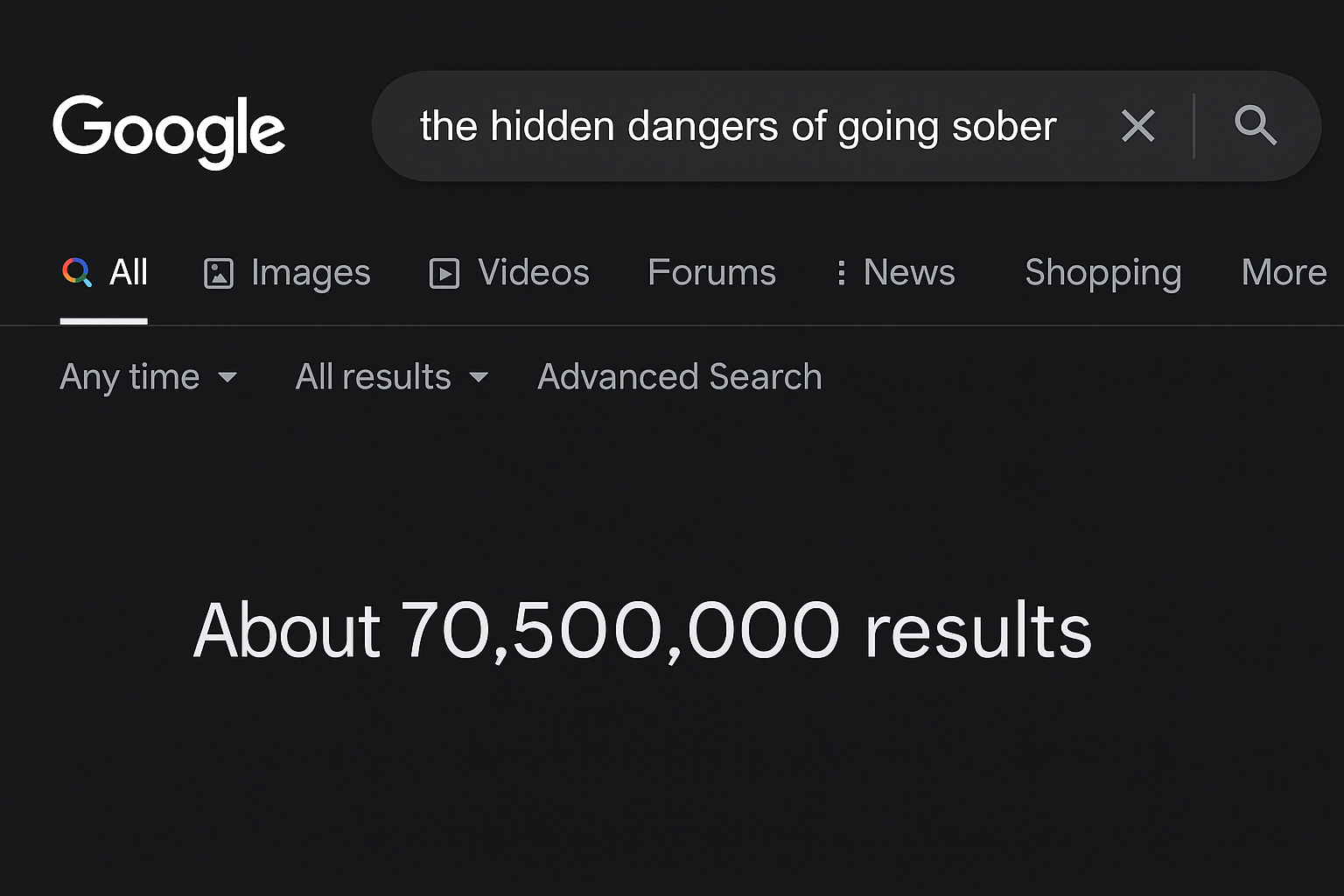Thinking about cutting back, but not sure if total abstinence is for you? There are over 70 million answers on Google alone.
When people type in things like ‘the hidden dangers of going sober,’ they’re already sensing what the research confirms. Total avoidance doesn’t always protect you.
Most people aren’t failing sobriety. They’re being failed by it.
Not because they’re weak. But because most programmes ask you to avoid alcohol forever, instead of teaching you how to handle it next Friday.
The problem with the “never again” model. For some, managed sobriety under medical supervision is essential. For others, it’s a valid lifestyle choice. ARC respects both. But blanket abstinence isn’t neutral. It comes with trade-offs, especially for those who don’t need it.
You wouldn’t solve debt by banning money or calorie control by banning restaurants. Yet many programmes treat all drinking as inherently dangerous, teaching avoidance rather than resilience. That works until, inevitably, life happens.
Data Check: 65% of abstainers relapse within 3 years (NIAAA, 2022).
In the United States, the picture is similar. According to the Substance Abuse and Mental Health Services Administration (SAMHSA), approximately 70% of individuals who achieve initial sobriety will experience at least one relapse.
One of the most overlooked issues? The loneliness that can follow. We’ve seen clients suffer anxiety attacks in social situations, lose connection with friends and family, and spiral into depression. When your entire coping mechanism is based on staying away from people and places you used to enjoy, the cost isn’t just psychological. It’s relational.
And the irony? No one warns you about that.
As psychologists have long noted, social connection is one of the biggest protective factors against relapse. Yet many abstinence models ignore the psychological toll of isolation, mistaking avoidance for resilience.
What moderation really teaches you: Moderation isn’t the easy way out. It’s the skilled way through.
It doesn’t rely on avoidance. It trains:
- Spotting triggers without panic
- Tolerating discomfort without needing a drink
- Rebuilding your reward system so alcohol isn’t your only relief valve– a core part of improving long-term dopamine regulation and self-efficacy
Data Check: Structured moderation programmes show 40%+ reduction in drinking sustained 5 years later (UKCTAS, 2023). In the U.S., data from the National Institute on Drug Abuse (NIDA) supports similar findings: behavioural self-regulation skills significantly reduce long-term consumption for non-dependent drinkers.
And moderation doesn’t ask you to trade your life for a new identity. ARC clients aren’t told to rethink their entire friendship group. They’re taught how to trust themselves within it.
Some sobriety models suggest rebuilding your social circle just to avoid temptation. We’d rather help you walk into old places with new skills and leave with your self-respect intact.
How ARC actually works ARC isn’t anti-sobriety. It’s pro-skill. We support people who want to cut back without cutting themselves off.
We don’t hand you a label. We don’t ask you to call yourself anything. We hand you tools and space to practise.
We train:
- How to recover from slips without shame. Because lapses aren’t failure, they’re feedback
- How to enjoy a few drinks, then know how to stop
- How to walk through a bar, wedding, or Tuesday night without dread
“Moderation doesn’t hand you a label or a mission. It hands you your evenings (and mornings) back.”
Here’s our take on the myths and truths in the whole debate.
We’ve looked at the most common claims made about sobriety and moderation, and here’s our take on what actually holds up.
Sobriety Myths vs Reality:
| Sobriety Myth | Reality | ARC Says |
|---|---|---|
| “Relapse is a failure.” | In abstinence models, relapse is treated as a shameful setback or proof of weakness. In reality, it often reflects a missing skillset or support plan. (UKCTAS, 2023 / NIDA) | We build slip recovery into the plan |
| “Avoiding alcohol is the safest option.” | Avoidance can increase cravings by up to 42% in certain cases (Dr. Anna Lembke, Stanford) | We train in-the-moment resilience |
| “You’re either sober or out of control.” | 58% of UK drinkers sustain reduced intake without total abstinence (Alcohol Change UK, 2022) / Similar trends observed in U.S. CDC survey data | We teach pacing, not perfection – because success isn’t about staying dry, it’s about staying deliberate |
Who this is (and isn’t) for Let’s be clear: ARC isn’t for everyone.
If you suspect you may be physically dependent on alcohol, it’s essential to speak to your GP. You may need a supervised programme to safely detox and recover.
What we offer is structured support for people who want to cut back without cutting themselves off.
We’re not for anyone looking for a rigid rulebook. Our approach builds your personal toolbox: some techniques will resonate more than others, and that’s exactly the point.
For the large majority of non-dependent drinkers who don’t meet clinical definitions of dependence, it’s a skillset that’s proven to reduce harm, improve quality of life, and restore trust in your own decision-making.
If you’ve ever taken a break, moderated successfully in the past, or know deep down that you don’t want to give up your favourite drink forever, but you do want control back, you’re our kind of client.
One last thought: One thing moderation doesn’t teach you? How to make your drinking status your personality. There’s no need to broadcast, convert, or hashtag your way through life. We’re the silent majority, just getting on with living well.
What’s next? Most people start seeing results within the first 7 days of the Essentials Plan. That early shift builds confidence. The next 3 weeks build tools and long-term belief in yourself. Ready to get started? Discover how much can change in 28 days.
[Explore the Essentials Plan]
Want to find out more about Alcohol Reset Coach? Click here
© 2025 Alcohol Reset Coach. All Rights Reserved.



Leave a Reply